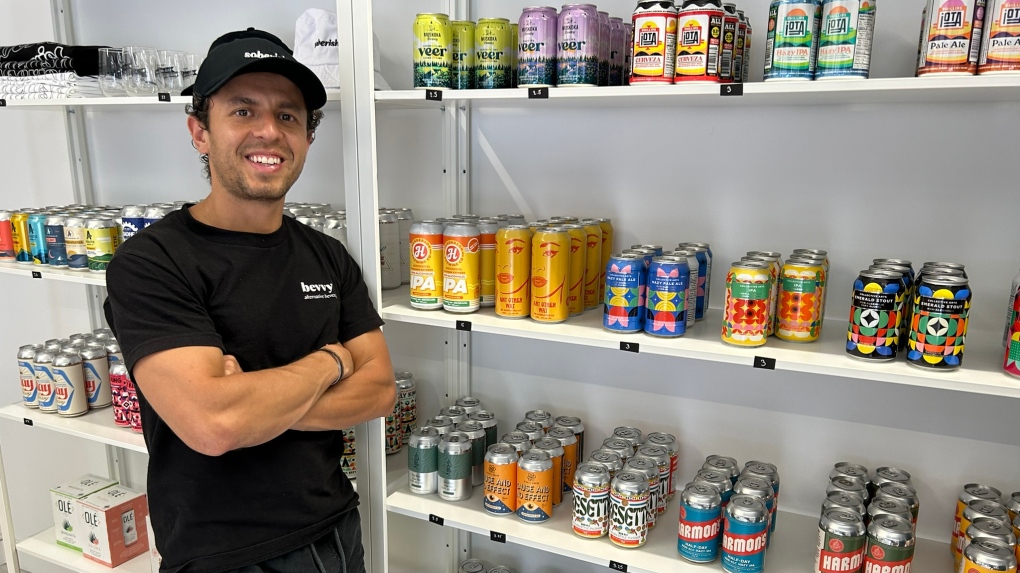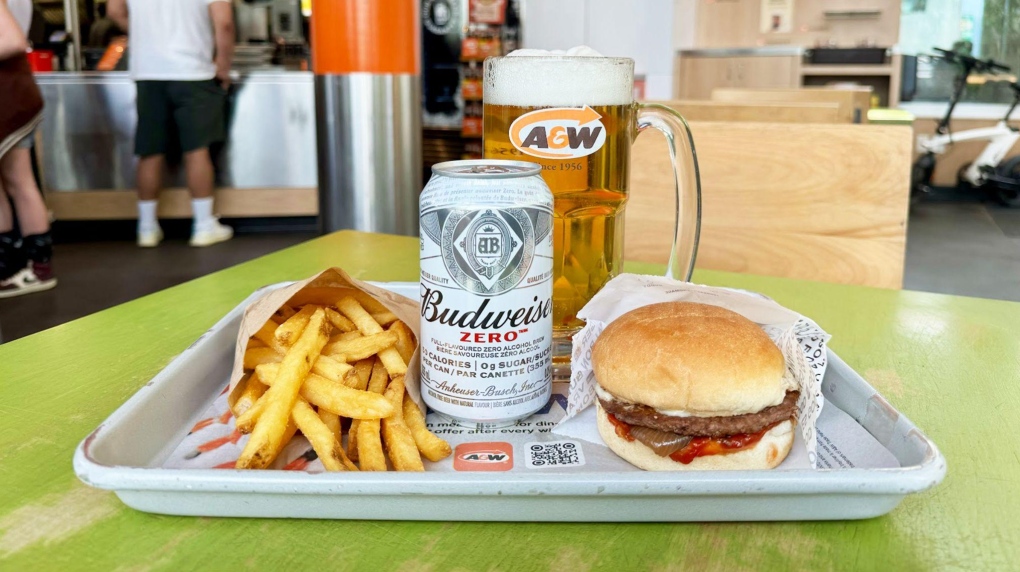'Drink different': LCBO strike an opportunity for the sober-curious
Cristian Villamarin says he's been sober-curious for around a decade, but for a long time he was not impressed with the offerings when it came to non-alcoholic wines and beers.
To be sure, his standards may have been higher than most.
"I used to work at a restaurant. And for anyone that has worked in the restaurant industry, you know drinking culture is pretty big," Villamarin says.
"What we did at this specific restaurant was like, on the Saturdays, every bottle of wine that was opened, the staff could drink it, because it was gonna go to waste. And I drank some amazing bottles of wine."
Working with people who understood wine led him deeper into wine culture. But with that, came a lot of drinking.
"You know, like every Saturday we drank a lot of bottles," Villamarin recalls. "And I just felt like that there was a lot of drinking in my life and I started pulling back and it was like, 'I need a month off.'"
That led to two months off, which eventually led to what Villamarin calls a "sober-ish lifestyle," where he still drinks, but only on special occasions.
He missed some of the beverages he used to enjoy, but found the non-alcoholic versions unappealing and stopped buying them.
Fast-forward a few years later to Victoria, B.C. where Villamarin was finishing up an Ironman.
"They handed me my first Athletic Brewing beer (a growing non-alcoholic beer brand). I tried that beer and I was like, 'whoa, what happened in this space?"
Villamarin, 34, is one of many people who see themselves as part of the growing "sober-curious" movement. The term broadly refers to people who are interested in either eliminating or greatly reducing their alcohol consumption.
His realization that non-alcoholic beverage options had vastly improved eventually led him to a business idea. Back in January, he opened Bevvy's, Toronto's first non-alcoholic bottle shop in Kensington Market.
The store offers a wide selection of non-alcoholic, or very low-alcohol (0.5 per cent) beers, wines and even spirits.
There's been lots of interest already from people who still want to have a drink at home or socially, but don't want to take in as much alcohol.
With LCBO stores having been closed for nearly two weeks due to a strike, Villamarin says he's seen lots of interested people wander into his store.
"With the LCBO (strike) we're noticing that there's definitely more curiosity," he says.
 Cristian Villamarin, owner of Bevvy's, shows off some of his wares at the non-alcoholic bottle shop in Kensington Market Thursday July 11, 2024. (Joshua Freeman /CP24)
Cristian Villamarin, owner of Bevvy's, shows off some of his wares at the non-alcoholic bottle shop in Kensington Market Thursday July 11, 2024. (Joshua Freeman /CP24)
The timing also lines up well, he notes, with many people taking part in "Dry July," an effort to cut out or reduce drinking for a month, as many people do in January.
"So it's a good time for people to try experimenting; going a week with no alcohol or going 15 days or a month," Villamarin says.
"I find that that's usually how this journey begins, is people trying it for Dry January, or even like taking two weeks off and then all of a sudden you feel really good and you start trying new drinks. You're like, 'I want to implement this as part of my life.'"
Health impacts compelling
Alcoholic beverages are still widely available in Ontario during the strike and Premier Doug Ford has even promoted a map showing 2,300 locations where you can purchase booze. But experts say the reduced availability could be a good opportunity for anyone who has thought about reducing their alcohol consumption to do so.
"We do know, in terms of looking at the amount the population might drink overall, that one of the most important levers that affects that is accessibility," says Dr. Leslie Buckley, Chief of the Addictions Division at the Centre for Addiction and Mental Health (CAMH) in Toronto. "And that can mean, you know, just retail density, so how easy it is to find a store that has it. Also, hours of operation and price is also really important – reducing price increases drinking, increasing prices reduces drinking."
New guidance released in January 2023 suggested that people think of every additional alcoholic drink as increasing their risks for various negative health outcomes, with no amount being deemed "safe."
"Any time, from our perspective, is a good time to be thinking about reducing your alcohol," Buckley says. "And you know, we're learning more about the benefits of reducing alcohol, which I would describe as reducing risks from the harms of alcohol, like seven types of cancer and liver disease, accidents, better sleep, good for your brain. And then emotionally, you know, you could consider that it might make you more present and authentic."
Buckley says in addition to not keeping alcohol at home, or eliminating it from regular routines, non-alcoholic beverages could be a good way to replace an unhealthy choice with a better one.
Options growing
While it might seem like a niche market, big players in the traditional alcohol market are also taking note.
Earlier this month, Labatt unveiled a pilot with A&W featuring the non-alcoholic Budweiser Zero as part of a combo deal with a burger and fries, making A&W the largest quick serve restaurant to offer non-alcoholic beer.
"We’re excited to be able to scale our non-alcoholic beer in A&W to give Canadians more choice when they are looking for the taste of beer without alcohol," Andrew Oosterhuis, Marketing Vice President of Labatt said in a statement.
The release from the companies noted that "negative perceptions around taste and the lack of trial are barriers that hinder the growth of the non-alcoholic category."
 A pilot in Ontario from Labatt and A&W features a non-alcoholic Budweiser Zero, paired with a burger and fries. (Handout)
A pilot in Ontario from Labatt and A&W features a non-alcoholic Budweiser Zero, paired with a burger and fries. (Handout)
Oosterhuis said having a positive experience with a trusted brand helps increase repeated consumption of non-alcoholic options.
While the big players are looking to grow their business with the sober-curious, more options appear to be sprouting up quickly.
Villamarin says the nonalcoholic beverage space is quickly growing, with other players entering the market in Toronto.
His shelves are stacked with a colourful assortment of imported and local options, from IPA's to ciders, to ‘Phony Negronis’ and more.
There’s also a growing culture around being sober-curious. Villamarin has an upcoming festival planned in November, dubbed "soberish fest," where people will be able to "explore and celebrate the best in premium non-alcoholic drinks."
The tagline for the event is "drink differently."
Alcohol-free beverages also change the game when it comes to options for socializing around drinks.
"We host running clubs on Fridays, and we're changing what a social Friday night is where we will go for a run here for like around 5k," Villamarin says. "And then everyone comes back and the patio is packed with people just having non-alcoholic cocktails. It's like people's Friday plan."
CTVNews.ca Top Stories

B.C. woman who sought $5K from neighbour over noise ordered to pay $50 for nuisance
A British Columbia woman who unsuccessfully sued her downstairs neighbour last fall for making too much noise has now failed in a bid to sue her upstairs neighbour for being too loud.
3 lost hikers rescued after night in North Vancouver backcountry
Search and rescue volunteers helped three hikers who were lost in North Vancouver’s backcountry Monday morning after an unexpected overnight stay in the mountains.
Astronaut reports strange sounds coming from troubled Starliner. Here's NASA's explanation
A mysterious, pulsating sound heard by one of two stuck-in-space astronauts coming from Boeing's troubled Starliner has been identified.
Canadian woman charged after $12.3M of meth allegedly found in luggage
A Canadian woman was charged after an estimated C$12.3 million of meth was allegedly found in her luggage in Australia.
Northern Ont. town taking applications for new mayor after previous one abruptly resigns
Éric Côté resigned as the mayor of the Township of Moonbeam last week and town council has decided to fill the mayoral vacancy by appointment.
Netanyahu pushes back against new pressure over Gaza and hostages: 'No one will preach to me'
Israeli Prime Minister Benjamin Netanyahu on Monday pushed back against a new wave of pressure to reach a cease-fire deal in Gaza after hundreds of thousands of Israelis protested and went on strike and U.S. President Joe Biden said he needed to do more after nearly 11 months of fighting.
Joey Chestnut breaks own world record, beating rival Takeru Kobayashi in Netflix hot dog eating showdown
Joey Chestnut demolished his world hot dog eating record Monday, beating longtime rival Takeru Kobayashi in a showdown billed as “unfinished beef” between the two biggest global stars in professional competitive eating.
Edmunds: The four biggest mistakes people make when buying a new car
Car buyers have more tools than ever to get the right vehicle at the right price. Still, mistakes can happen quite easily.
Investigative journalist Stevie Cameron dies at home in Toronto, age 80
An investigative journalist who authored books that tackled topics ranging from a prime minister's involvement in jet purchases to the murders of women on a British Columbia pig farm has died.
































